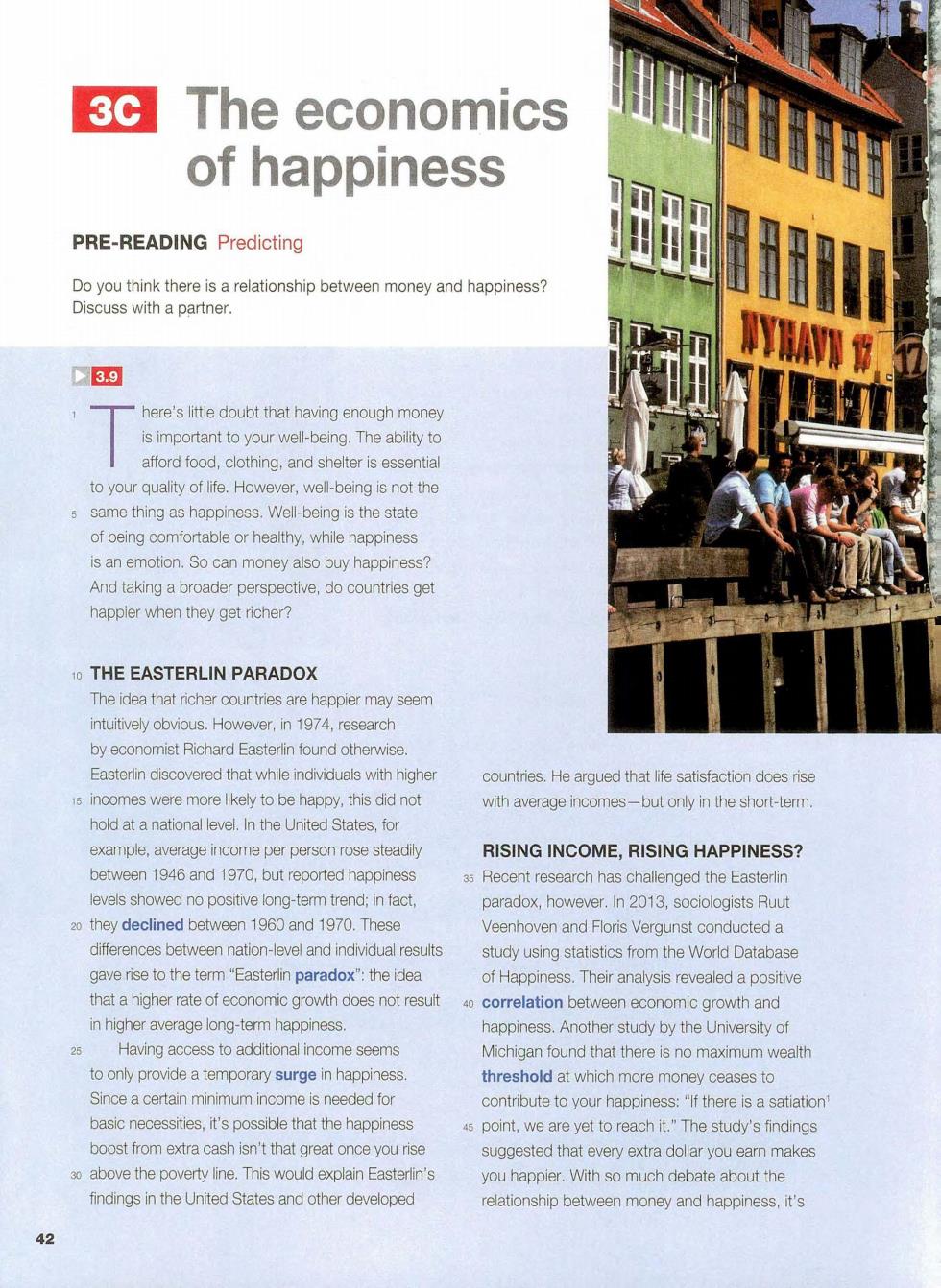正在加载图片...

3c The economics of happiness PRE-READING Predicting Do you think there is a relationship between money and happiness? Discuss with a partner. 3.9 here's litle doubt that having enough money is important to your well-beina.The ability to afford food.clothing.and shelter is essential to your quality of life.However,well-being is not the s same thing as happiness.Well-being is the state of being comfortable or healthy.while happiness is an emotion.So can money also buy happiness? And taking a broader perspective,do countries get happier when they get richer? THE EASTERLIN PARADOX The idea that richer countries are happier may seem intuitively obvious.However.in 1974.research by economist Richard Easterin found otherwise Easterlin discovered that while individuals with highe countries.He argued that life satisfaction does rise sincomes were more likely to be happy,this did not with average incomes-but only in the short-term hod at a national level.In the United States,for example,average income per person rose steadily RISING INCOME,RISING HAPPINESS? between 1946 and 1970.but reported happiness as Recent research has challenged the Easterlin levels showed no positive long-term trend:in fact paradox,however.In 2013,sociologists Ruut 20 they declined between 1960 and 1970.These /eenhoven and Floris Vergunst conducted a differences between nation-level and indidual results study usina statistics from the world database gave rise to the term "Easterlin paradox":the idea of Happiness.Their analysis revealed a positive that a higher rate of economic growth does not resuit correlation between economic growth and in higher average long-term happiness nappiness.Another study by the University of 25 Havina access to additional income seems Michigan found that there is no maximum wealth to only provide a temporary surge in happiness threshold at which more mone ceases to Since a certain m is needed for ontribute to your happiness:"If there is a satiation basic necessities,it's possible that the happiness s Doint.we are vet to reach it.The study's findinas boost from extra cash isn't that great once you rise suggested that every extra dollar you eam makes above the poverty line.This would e explain Easterlin's you happier.With so much debate about the indings in the United States and other deve relationship between money and happiness,it's 42 ■ 3C e econom1cs ■ a 1ness PRE-READING Predicting Do you think there is a relationship between money and happiness? Discuss with a p~rtner. 1 m here's little doubt that having enough money is important to your well-being. The ability to afford food, clothing, and shelter is essential to your quality of life. However, well-being is not the s same thing as happiness. Well-being is the state of being comfortable or healthy, while happiness is an emotion. So can money also buy happiness? And taking a broader perspective, do countries get happier when they get richer? 10 THE EASTERLIN PARADOX The idea that richer countries are happier may seem intuitively obvious. However, in 197 4, research by economist Richard Easterlin found otherwise. Easterlin discovered that while individuals with higher 1s incomes were more likely to be happy, this did not hold at a nationalevel. In the United States, for example, average income per person rose steadily between i 946 and i 970, but reported happiness levels showed no positive long-term trend; in fact, 20 they declined between i 960 and i 970. These differences between nation-level and individual results gave rise to the term "Easterlin paradox": the idea that a higher rate of economic growth does not result in higher average long-term happiness. 2s Having access to additional income seems to only provide a temporary surge in happiness. Since a certain minimum income is needed for basic necessities, it's possible that the happiness boost from extra cash isn't that great once you rise 30 above the poverty line. This would explain Easterlin's findings in the United States and other developed countries. He argued that life satisfaction does rise with average incomes-but only in the short-term. RISING INCOME, RISING HAPPINESS? 35 Recent research has challenged the Easterlin paradox, however. In 20i 3, sociologists Ruut Veenhoven and Floris Vergunst conducted a study using statistics from the World Database of Happiness. Their analysis revealed a positive 40 correlation between economic growth and happiness. Another study by the University of Michigan found that there is no maximum wealth threshold at which more money ceases to contribute to your happiness: "If there is a satiation 1 45 point, we are yet to reach it." The study's findings suggested that every extra dollar you earn makes you happier. With so much debate about the relationship between money and happiness, it's